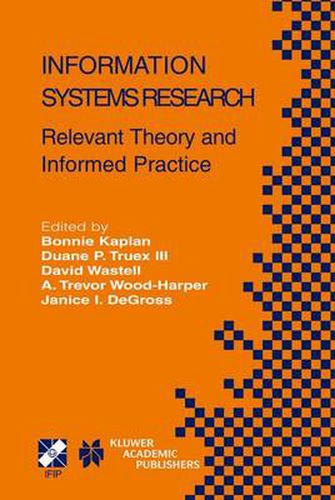Readings Newsletter
Become a Readings Member to make your shopping experience even easier.
Sign in or sign up for free!
You’re not far away from qualifying for FREE standard shipping within Australia
You’ve qualified for FREE standard shipping within Australia
The cart is loading…






This title is printed to order. This book may have been self-published. If so, we cannot guarantee the quality of the content. In the main most books will have gone through the editing process however some may not. We therefore suggest that you be aware of this before ordering this book. If in doubt check either the author or publisher’s details as we are unable to accept any returns unless they are faulty. Please contact us if you have any questions.
In 1984, Working Group 8.2 of the International Federation for Information Processing (IFIP) threw down the gauntlet at its Manchester conference, challenging the traditionalist orthodoxy with its uncommon research approaches and topics. Manchester 1984, followed by research methods conferences in Copenhagen (1990) and Philadelphia (1997), marked the growing legitimacy of the linguistic and qualitative turns in Information Systems research and played a key role in making qualitative methods a respected part of IS research. As evidenced by the papers in this volume, Working Group 8.2 conferences showcase fresh thinking, provocative sessions, and intellectual stimulation. The spirited, at times boisterous, and always enlivening debate has turned WG8.2 conferences into life-changing and discipline-changing inspirational events. Information Systems Research: Relevant Theory and Informed Practice comprises the edited proceedings of the WG8.2 conference, Relevant Theory and Informed Practice: Looking Forward from a 20-Year Perspective on IS Research, which was sponsored by IFIP and held in Manchester, England, in July 2004. The conference attracted a record number of high-quality manuscripts, all of which were subjected to a rigorous reviewing process in which four to eight track chairs, associate editors, and reviewers thoughtfully scrutinized papers by the highly regarded as well as the newcomers. No person or idea was considered sacrosanct and no paper made it through this process unscathed. All authors were asked to revise the accepted papers, some more than once; thus, good papers got better. With only 29 percent of the papers accepted, these proceedings are significantly more selective than is typical of many conference proceedings. This volume is organized in 7 sections, with 33 full research papers providing panoramic views and reflections on the Information Systems (IS) discipline followed by papers featuring critical interpretive studies, action research, theoretical perspectives on IS research, and the methods and politics of IS development. Also included are 6 panel descriptions and a new category of bright idea position papers, 11 in all, wherein main points are summarized in a pithy and provocative fashion.
$9.00 standard shipping within Australia
FREE standard shipping within Australia for orders over $100.00
Express & International shipping calculated at checkout
This title is printed to order. This book may have been self-published. If so, we cannot guarantee the quality of the content. In the main most books will have gone through the editing process however some may not. We therefore suggest that you be aware of this before ordering this book. If in doubt check either the author or publisher’s details as we are unable to accept any returns unless they are faulty. Please contact us if you have any questions.
In 1984, Working Group 8.2 of the International Federation for Information Processing (IFIP) threw down the gauntlet at its Manchester conference, challenging the traditionalist orthodoxy with its uncommon research approaches and topics. Manchester 1984, followed by research methods conferences in Copenhagen (1990) and Philadelphia (1997), marked the growing legitimacy of the linguistic and qualitative turns in Information Systems research and played a key role in making qualitative methods a respected part of IS research. As evidenced by the papers in this volume, Working Group 8.2 conferences showcase fresh thinking, provocative sessions, and intellectual stimulation. The spirited, at times boisterous, and always enlivening debate has turned WG8.2 conferences into life-changing and discipline-changing inspirational events. Information Systems Research: Relevant Theory and Informed Practice comprises the edited proceedings of the WG8.2 conference, Relevant Theory and Informed Practice: Looking Forward from a 20-Year Perspective on IS Research, which was sponsored by IFIP and held in Manchester, England, in July 2004. The conference attracted a record number of high-quality manuscripts, all of which were subjected to a rigorous reviewing process in which four to eight track chairs, associate editors, and reviewers thoughtfully scrutinized papers by the highly regarded as well as the newcomers. No person or idea was considered sacrosanct and no paper made it through this process unscathed. All authors were asked to revise the accepted papers, some more than once; thus, good papers got better. With only 29 percent of the papers accepted, these proceedings are significantly more selective than is typical of many conference proceedings. This volume is organized in 7 sections, with 33 full research papers providing panoramic views and reflections on the Information Systems (IS) discipline followed by papers featuring critical interpretive studies, action research, theoretical perspectives on IS research, and the methods and politics of IS development. Also included are 6 panel descriptions and a new category of bright idea position papers, 11 in all, wherein main points are summarized in a pithy and provocative fashion.